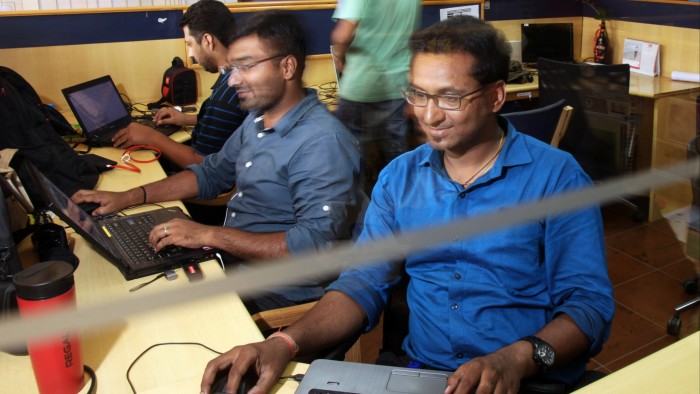India’s vast information technology outsourcing sector is hoping for a revival of its fortunes under a second Donald Trump presidency, with an industry that derives more than half its revenues from the US expecting incentives for its customers there to increase spending.
With the new administration promising to slash corporate taxes and tame red tape, India’s $128bn annual revenue back office and consultancy sector, with its huge campuses across cities from Bengaluru to Pune, sees opportunity in its largest market after years of anaemic demand and growth.
“Mr Trump in the past has been very business savvy,” Atul Soneja, chief operating officer at Tech Mahindra — the IT business of the Mahindra Group conglomerate — said in an interview in Bengaluru. “We should hopefully start seeing the benefit.”
IT and business process outsourcing is one of India’s most important and global-facing industries, employing more than 5mn people in a country that has thus far been unable to provide large numbers of well-paid and formal job opportunities for its enormous labour force.
The sector enjoyed a surge of business as clients invested in digital services during the coronavirus pandemic. But that led to Indian tech giants becoming bloated after a hiring splurge, and the industry was hit as corporates cut back on spending with global economic pressures increasing.
Tata Consultancy Services, India’s largest IT company, which last week reported a fifth straight decline in quarterly revenue in North America, expects a better year, in part due to improving client spending as Trump takes office this week.
“Once the new administration comes in, that will also remove any uncertainty,” said K Krithivasan, TCS chief executive. “There will be more confidence in discretionary programmes coming into the next financial year.”
Nandan Nilekani, the billionaire co-founder and chair of India’s second-largest IT services company Infosys, told the Financial Times in November that the “bull case” for the industry would be that Trump’s presidency would “unleash market deregulation”, allowing companies to expand, while spurring more mergers and takeovers, all providing business to India’s outsourcers.
His comments were echoed soon after by Rishad Premji, chair of rival Wipro, who said he believed Trump’s administration would be “very pro-business and pro-growth, which helps all of our customers, which ultimately helps partners here in India and the world over”.
HSBC analysts estimate the industry will see growth accelerate to 6 per cent in the next financial year, up from about 3-4 per cent over the past two years, adding that the US outlook is now positive.
“Any tax cuts would drive more technology spending, that’s a fair assumption,” said Sid Pai, the Bengaluru-based co-founder of venture capital tech investor Siana Capital Management, who expected “steady growth” across the sector.
The renewed optimism comes as US tech executives have been beating a path to India in recent months. Last week, Microsoft chief executive Satya Nadella set forth a $3bn investment, while in October, Nvidia chief Jensen Huang came to Mumbai and announced a batch of artificial intelligence partnerships with the country’s biggest conglomerates and outsourcing giants.
However, Trump’s “America First” protectionist stance promises to slap countries with dramatic tariffs — damaging growth, fuelling inflation and leading to the Federal Reserve being more cautious on lowering interest rates, according to a recent FT poll of more than 220 economists.
“A large part of demand recovery for IT services companies is dependent on how the US economy performs in 2025,” said Kumar Rakesh, a Mumbai-based associate director of equity research at BNP Paribas, warning conditions for the sector could worsen if policy changes were to boost inflation and force a pause or even a reversal in rate cuts.
HSBC analysts noted that Trump tax cuts in 2017 did not necessarily have a clear impact on tech spending. During the last Trump presidency, the industry also fell foul of tightening restrictions on the high-skilled H-1B visa programme which is overwhelmingly used by Indian nationals.
While Elon Musk, Trump’s biggest tech industry backer, has argued there is “a dire shortage” of IT engineers in America, Indian outsourcers have since significantly reduced their dependency on H1-B workers in the US where they have offices servicing clients locally. Rakesh said less than 1 per cent of outsourcing industry employees now work on such visas.
More widely, economists and industry figures in India expect the world’s most populous nation, which has been edging closer into Washington’s orbit and whose leader, Narendra Modi, shares good relations with Trump, could be shielded from the worst of the US leader’s impulses.
“The relationships between the two leaders have been very strong in the past as well, so we expect that to continue,” said Tech Mahindra’s Soneja.
Teresa John, deputy head of research at Mumbai brokerage Nirmal Bang, who recently published research on the potential impact of “Trumponomics” on India, said overall the country is likely to “be relatively insulated” compared with other Asian nations, such as China, given its lower trade surplus with the US.
“US growth is going to hold up,” she added. “We will see that flowing through to the Indian IT sector.”



